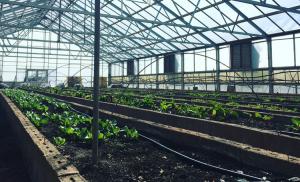- 2 reads

This is one of the profiles in an ongoing series covering next generation agriculture. We are seeing an increased trend for indoor farming across the United States and around the world. This is a positive trend given that local farming reduces adverse CO2 emissions from moving food long distances. If you would like us to review and profile your company, just let us know! Contact Us.
Company Profile: Lynchburg Grows
Here is a great example of a large scale urban farm serving the Lynchburg area.
Here is some of the “About Us” content: Lynchburg Grows is a seven-acre urban farm dedicated to providing access to fresh, local, produce for Lynchburg residents, restaurants, and organizations, while also providing onsite vocational training for disabled and low-income individuals. The story of Lynchburg Grows is deeply rooted in a sense of community and help and its mission reflects those roots.
In 2003, a man name Paul Lam, himself disabled, witnessed the destruction of the garden he had lovingly cared for, all due to a miscommunication error. So Mr. Lam, along with a few volunteers, began the search for a new space in which to garden. Eventually, they came upon The old Schenkel Farm - nine abandoned greenhouses on six-and-a-half acres, where the Schenkel family had raised roses for decades, producing over 1.3 million roses per year. The farm was overgrown, and in need of a loving touch.
After appealing to local colleges and schools, volunteers poured in - over 700 in 18 months - and the early seed of Lynchburg Grows was planted. Since that time, Lynchburg Grows' employees, volunteers, donors, and board members have worked to continue the vision of Mr. Lam while providing workplace opportunities, quality produce, and still continuing to provide roses for the Lynchburg Community.
When Lynchburg Grows first purchased the Schenkel farm, the greenhouses full of roses had been left unattended for several years. Many were damaged and overgrown beyond repair. One of the first projects undertaken was to identify and salvage the rose bushes that were most likely to survive. These bushes were then consolidated into a single greenhouse, where they stand to this day as a reminder of our history, and as an important (and beautiful) addition to our offerings.
Of the remaining eight greenhouses, seven of them house produce grown with all organic methods. Our produce supplies local restaurants, fulfills our CSA needs, and is distributed through our mobile food van program. The final greenhouse is tended by volunteers from St. John's Episcopal Church, and the food harvested from that greenhouse is distributed to Daily Bread.
Here is the link to learn more: http://www.lynchburggrows.org/.
To date, the cost of man made lighting has been a barrier for indoor agriculture. A new generation of LED lighting provides cost effective opportunities for farmers to deliver local produce. Warehouses and greenhouses are both viable structures for next generation agriculture. Here is one example of next generation made in USA LED grow light technology to help farmers: Commercial LED Grow Lights.

